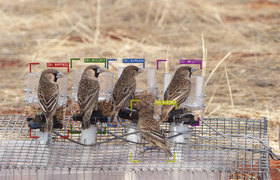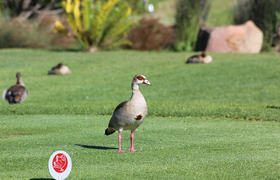Lockdown 2020: Birds bask on barren Muizenberg beach
13 April 2022 | Story Niémah Davids. Photo Getty Images. Read time 4 min.
As humans were ordered to stay indoors to curtail the spread of COVID-19 during the early days of the pandemic in 2020, it appears that our feathery friends came out in their numbers to get their dose of vitamin sea.
A research paper titled “Effects of COVID-19 lockdowns on shorebird assemblages in an urban South African sandy beach ecosystem” has confirmed this. Authored by a team of researchers in the Department of Biological Sciences at the University of Cape Town (UCT), the paper revealed that a striking number of birds descended on Muizenberg beach during lockdown Level 5 to enjoy this natural habitat without any human disturbances. The paper was published in Scientific Reports, a leading peer-reviewed scientific journal, last month.
According to lead author Associate Professor Deena Pillay, the team set off to understand how birds would respond to the sudden changes in the number of beachgoers permitted on the beach during the various stages of lockdown.
“We used standardised photos of Muizenberg beach between 2019 (pre-COVID-19) and 2020 (during COVID-19 lockdown) to quantify the relationship between human and bird numbers on the beach.”
“We used standardised photos of Muizenberg beach between 2019 (pre-COVID-19) and 2020 (during COVID-19 lockdowns) to quantify the relationship between human and bird numbers on the beach,” Associate Professor Pillay said.
A rare opportunity
Because beaches are one of earth’s most utilised ecosystems for recreation, Pillay said that conducting this type of research would ordinarily have been quite tricky. But lockdown offered researchers a unique opportunity to get to work and answer timely and relevant questions. A barren beach was just what researchers needed and meant that Pillay and his team, which included MSc student Jemma Lewis and BSc honours student Jayden Collison (co-authors on the paper) could begin to measure just how much increasing human numbers impacted bird numbers on this urban beach.
“Without graded lockdowns it would’ve been almost impossible to generate human-free spaces and times at the scales needed to detect ecological responses. Our work sheds new light on how increasing human numbers on beaches for recreation can affect these sensitive ecosystems and key organism groups,” he said.
The outcome
The team’s findings indicated a six-fold increase in the number of birds on Muizenberg beach during lockdown Level 5 in 2020 when compared with the same period in 2019. Subsequently, as lockdown measures eased, and about 34% of beachgoers returned to their happy place on the sand and in the sea, bird numbers declined by almost 80%. With these findings, Pillay said the team achieved their goal, which was to demonstrate just how sensitive beach ecosystems are to increasing human numbers.
“The potential effects of humans on beach ecosystems should not be underestimated, and neither should the value of using data collected during COVID-19 lockdowns to refine our understanding of human–nature interactions,” he said.
When life gives you lemons
Pillay said he hoped that the team’s findings would help people understand just how sensitive birds are to high levels of human activity on beaches. The research team hopes to use their findings in public education initiatives to help people make more informed decisions when interacting with beach ecosystems.
The project also demonstrates the ingenuity and commitment from students who used the COVID-19 pandemic as a critical research opportunity to answer questions that could not previously be addressed.
“This project idea was Jemma’s. Her keen eye to see opportunities where others saw problems is admirable. Hard lockdown [was] a major source of stress for students engaging in fieldwork, but Jemma and Jayden used [it] as a golden research opportunity,” Pillay said.
“This research epitomises the saying ‘When life gives you lemons, make lemonade’.”
 This work is licensed under a Creative Commons Attribution-NoDerivatives 4.0 International License.
This work is licensed under a Creative Commons Attribution-NoDerivatives 4.0 International License.
Please view the republishing articles page for more information.










